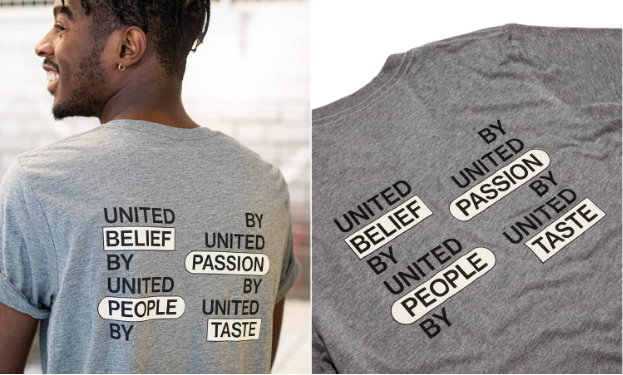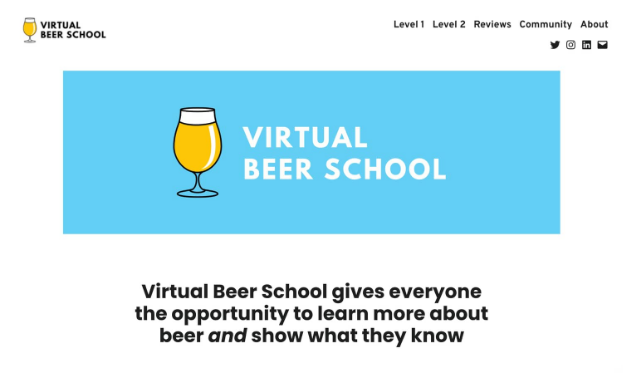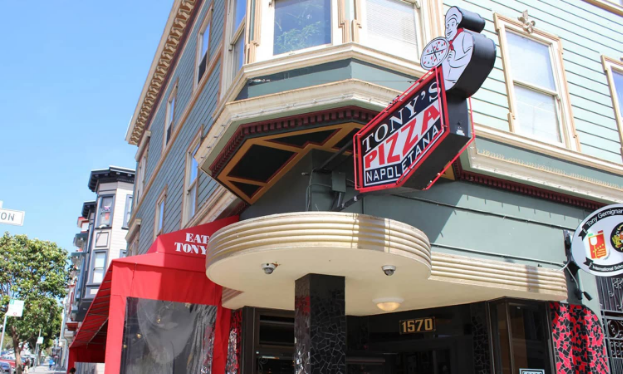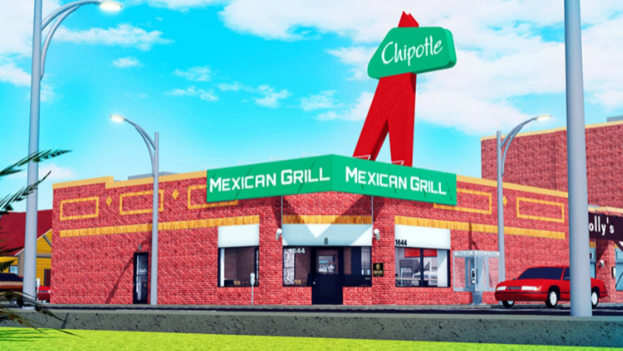We continue the section “Resolution Store”, in which we collect interesting marketing cases for enterprises in the HoReCa industry. Only time-tested resolutions for sales development and customer loyalty management. First release here (post link of September material)
-
The era of alcohol merch
The history of catering merch began in 1988, when the Hard Rock Cafe chain opened the first store in New York with rock-inspired T-shirts, key chains, and leather jackets. Now branded bombers and caps can be bought in almost any establishment — from a craft bar to a gourmet restaurant.

BrewDog souvenir T-shirt: «United by faith, united by passion, united by people, united by taste»
Sell branded glasses, T-shirts, caps, coasters and other souvenirs to your customers. They will receive beer «as a gift» so that not a single government authority get after.
Your visitors understand everything. Tell them an interesting story about your community development plans at your favorite restaurant, and they will definitely support you by buying a branded souvenir. Nothing brings people together better than branded clothing and paraphernalia.
It is worth saying in advance that it will not work to earn a lot on merchandise at a restaurant or cafe. High-quality things mean expensive ones, and you can’t set a high margin for a high cost: there will be few people who want to buy T-shirts for several hundred dollars. Therefore, immediately get used to the opinion that merch is about PR, but not about making money.
A markup of 200-300% can be set only for small items — souvenirs, baseball caps or T-shirts, because they have a lower cost. More serious things like hoodies, which are very expensive to manufacture, cannot be sold at a markup of more than 100%. Otherwise, the price will be sky-high, and the branded collection will “hang” for a long time.
-
Get Drunk – Teach
During the lockdown, the author visited an online tasting of Italian wines. In order to fully “taste” the broadcast, I had to buy three new items from the region in the store, about which there was a story at the online meeting.
And if you can tell, show, teach something, start doing it now. The moral is simple: bring values to the masses and take money for it. Consumers are constantly looking for interesting tutorials on cooking sushi, eating cheese with wine, beer, hard alcohol. Sources of ideas — a great many!
Tell about your training programs in such a way that visitors are willing to pay for the opportunity to expand their horizons. By the way, I wonder who can be a supplier of craft beer for participants in such virtual tastings in pubs?
In the segment of alcoholic beverages, it is extremely easy to look for ideas that can be interesting to tell and teach, combined with the element of tasting and trying. Finally, ask your visitors what they would like to know about first.

Specialized online schools like Virtual Beer School — for some institutions will be the next step. Or a separate demanded business.
If you can’t come up with an idea and hold the event yourself, invite a speaker. We are sure that even your visitors can show and teach others something useful and excitingly delicious.
-
Alcohol crowdfunding
A very popular topic that hardly takes root in HoReCa is donation of the company’s activities through the participation of the population.
Let’s break it down piece by piece. There is nothing reprehensible and even more illegal in such activities. Feel free to add a «Donate» button to all your social accounts, place it prominently on your site, and explain to customers how they can support you.
Donation goes well with a learning tool (see point 2). The chef conducts an online master class for housewives on cooking exotic dishes. Donate. The bartender teaches how to prepare authentic drinks. Donate. Well, you get the idea.
Of the minuses: do not count too much on this tool. There is more advertising than business here. During the first wave of pandemic restrictions, some catering establishments introduced similar crowdfunding projects, but, according to them, this brought no more than 10% of their usual revenue.

In order for crowdfunding in catering to work, several conditions must be met:
— Firstly, you are not begging, but you are doing good.
Be honest with visitors — you can ask for a reward for a good mood and useful content.
— Secondly, if you yourself do not believe that the use of such a tool is not something shameful, you will not be so convincing that the client believes you and sends money.
— And finally, thirdly, the “Donate” button should be visible on the main pages of all your accounts.
There are plenty of cases where “there is a CTA, but it’s hard to find.” Even among those who tried to introduce the mechanism of popular fundraising during the lockdown.
For visitors, everything should be simple and clear. In the Tony’s Pizza Napoletana bartending competition, in which each participant had to come up with one original cocktail, visitors voted for the best drink on Instagram, and donations could be transferred using several payment platforms.
Crypto announcement
Did you know that a large portion of the restaurant industry is ready to dive into what the metaverse could become? Many leading brands, including McDonald’s, Burger King, Panera Bread, Wingstop, Yum Brands, and Inspire Brands, have filed for trademarks in the Metaverse and are just waiting for the Metaverse to switch into our daily Internet surfing.
And loyalty program tools such as points and rewards with gamification (see “gamification” in issue 1 — link to September material) in the metaverse provide more opportunities for customers to interact with brands.

Chipotle Restaurant in the Metaverse
The blockchain industry is being mastered by bold catering players quite successfully. We have already found dozens of interesting cases of how public catering enterprises successfully master such “hype” tools of the Web3 industry as cryptocurrency, NFT and blockchain, and manage to make decent money at the same time. Material has accumulated for a whole review. With which we plan to introduce you in the next issue.
If it seems to you that we are raising the bar with our promise to increase your digital competencies, this is not so. The Metaverses will be the next generation of social media, a new home for the digital loyalty program, and huge branding opportunities for restaurants and cafes of all sizes. After all, it doesn’t occur to anyone today to question the importance of social networks for restaurants and coffee shops? Although even 13-15 years ago, heated debates about them were favorite discussions at professional events.
We can guarantee: new — digital — knowledge and skills will definitely be useful to you and will certainly be in demand. Are there any limits to expanding the customer experience?
Cheers!
